Another IRGC Aerospace Force Officer Reportedly Killed In Iran
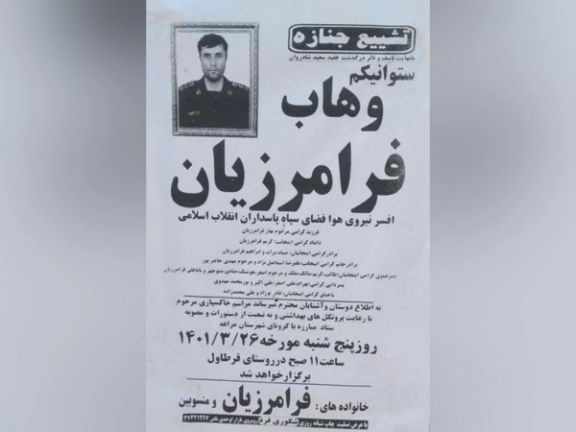
Less than a week after Iran announced the death of two IRGC Aerospace Force officers under mysterious circumstances, another officer of the unit died, unconfirmed reports say.

Less than a week after Iran announced the death of two IRGC Aerospace Force officers under mysterious circumstances, another officer of the unit died, unconfirmed reports say.
The officer was identified as Vahab Faramarzian and reportedly died in Maragheh in East Azarbaijan province.
According to photos of his obituary published on some secondary websites, his funeral service was held on Thursday in the village of Qartavol, near Maragheh.
The Revolutionary Guard has yet to comment on his death.
Iran International quoted an informed source as saying on Monday that the two IRGC Aerospace Force officers whose deaths were announced Sunday were engaged in "developing arms for Lebanon's Hezbollah,” adding that Ali Kamani and Mohammad Abdus, both Revolutionary Guard’s aerospace engineers, "were not killed in accidents" as the Islamic Republic claimed.
The two died in separate incidents in two different locations, but the source did not provide further details about the circumstances of their deaths. What was clear from the information received is that the two officers did not die as a result of a car or work place accident.
Iranian media first announced that Kamani died in a “car accident in line of duty” in Khomein, in central Iran, before news came that another aerospace Force officer had also died in the province of Semnan "on line of duty".
A series of other killings and deaths among IRGC ranks in Iran in recent weeks has led to suspicion that they might have been targets of a secret series of operations, purportedly by Israel’s Mossad.
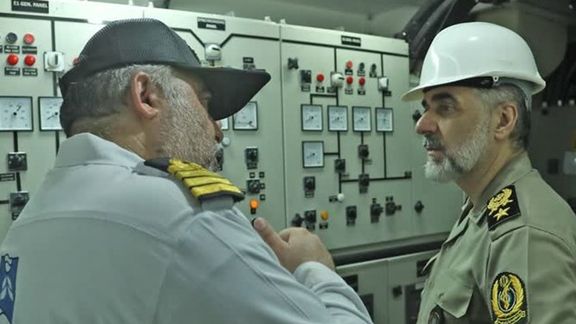
The Iranian defense minister reiterated Iran’s position Friday that the cause of insecurity in the region is the presence of extra-regional foreign forces.
Brigadier General Mohammad-Reza Gharaei Ashtiani made the remarks during his trip to the southern province of Hormozgan, where he visited the Ministry of Defense's naval projects in Bandar Abbas and other cities.
“Our message to the region and the world is a message of peace and tranquility,” he said, adding that “we believe that peace and stability in the region can be achieved with the presence and participation of all countries in the region.”
Iran often uses foreign forces in the region” to refer to the military presence of the United States in the Middle East and the Persian Gulf.
Having been briefed on the projects to build destroyers as well as surface and submarine vessels, Ashtiani said, "Increasing Iran’s military might in all aspects of defense, including land and air, and especially sea, is one of the priorities of the country's defense programs."
Highlighting that Iran's geopolitical position in the Persian Gulf is of strategic importance to the country, he said that the Defense Ministry will update and equip the Navy “in accordance with the regional threats in all its territorial waters.”
On Tuesday, the Israeli defense minister intensified pressure on Iran by calling for a military front with US leadership in the Middle East ahead of a visit to the region by President Joe Biden, saying that Israel and Arab countries that share its worries about Iran should build up their military capabilities under Washington's aegis.
Describing Iran as the most destabilizing force in the Middle East, the new CENTCOM commander in May called for coordinated efforts to confront Iran.
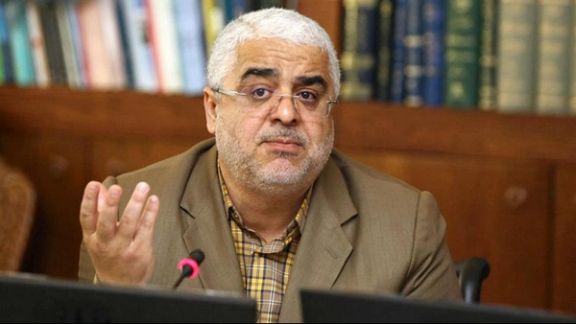
A former lawmaker is the first Iranian politician who has spoken about an alleged quarrel between high-ranking state officials over the nuclear issue recently.
According to the highly active political rumor mill in Iran, Former parliament speaker Ali Larijani and Supreme Council of national Security Secretary Ali Shamkhani lashed out at ultraconservative Saeed Jalili after he voiced support at the Expediency Council for the idea of Tehran exiting the Nuclear Non-proliferation Treaty (NPT).
Jalili was Iran’s chief nuclear negotiator during the presidency of Mahmoud Ahmadinejad when Iran was nabbed with international sanctions. He is also the long-time mentor of current negotiator, Ali Bagheri-Kani.
Reformist newspaper Sharq later revealed that the news of the quarrel was first disclosed by "Ammarioun," an ultraconservative group close to the IRGC and the ultraconservative Paydari Party that had nominated Jalili as their candidate for presidency in 2013.
The former lawmaker, Gholamreza Jafarzadeh Imanabadi said in an interview with Didban Iran [Iran Monitor] website that he is not aware of the details of the argument, but he added that "It is obvious the country cannot be run based on the ideas of Mr. Jalili," who is a staunch opponent of an agreement with the United States. Imanabadi further characterized Jalili as a "warmonger."
However, Imanabadi's criticism of the government goes beyond his opposition with Jalili's rejectionism. He said, "all those who engineered the 2021 presidential election and brought Ebrahim Raisi to power should be accountable for what they did."
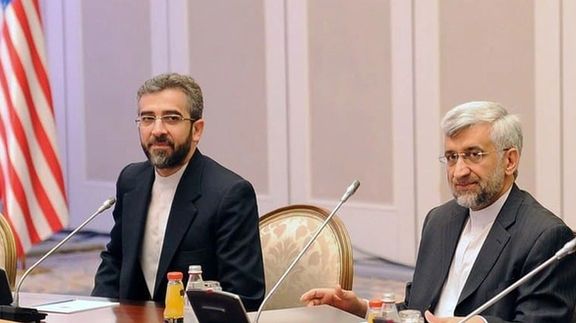
"It is not important to know who fought whom at the Expediency Council. The real struggle is about the people's life and livelihood."
Imanabadi charged that "Raisi is to be blamed for all the swear words people use against the regime." The former lawmaker further warned that if Iran ever exits the NPT, the Islamic Republic and the Iranian people will have to face an emergency situation.
He said that individuals such as Jalili are determined to ruin the last remnants of the people's livelihood. Elaborating on the perils of the Raisi administration's economic policy, Imanabadi said that a tripling of tax revenues this year is tantamount to picking the nation's pockets.
He further criticized Interior Minister Ahmad Vahidi for saying that prices of only four food items have increased, adding that Mr. Vahidi has never visited the kitchen in his own home!
On the nuclear deal with world powers and negotiations with the United States, he said: "Whether you like it or not, the people's livelihood is tied to the nuclear deal and relations with other countries. You cannot say that you want a dynamic economy and at the same time be sulking with all countries!" He further charged that "the Raisi administration is the weakest government Iran has ever had and Mr. Raisi does not know anything about how to run a country."
In another development, according to the conservative Nameh News website, political analyst Gholamreza Zarifian suggested that Raisi should benefit from the experience of former ultraconservative President Mahmoud Ahmadinejad.
He added that Iran has so many economic problems that the only solution is trying to have the sanctions lifted. "I hope Raisi would benefit from the experiences of his predecessors Rouhani and Ahmadinejad."
Zarifian was referring to the fact that Ahmadinejad called UN resolutions shreds of paper and ignored warnings about Iran’s nuclear program, which led to international sanctions, while President Hassan Rouhani used diplomacy to negotiate with the United States and have the sanctions lifted for a few years.
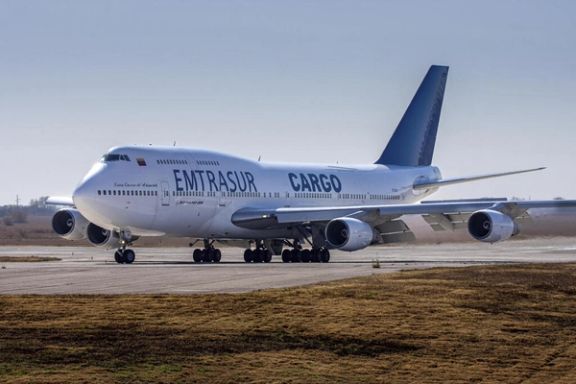
The Israeli embassy in Buenos Aires says one of the Iranian crew of the grounded Venezuelan cargo plane in Argentina was a member of the Revolutionary Guards' Quds Force.
The embassy released a statement on Thursday, saying that the Boeing 747 registered as a Venezuelan cargo plane was used by the Iranian company Mahan Air and transported “a group of Iranian officials, including a senior executive of the airline Qeshm Fars Air.” It was referring to Gholamreza Ghasemi, who apparently was the pilot and is a member of the IRGC and a former board member of Fars Air Qeshm accused of transporting weapons for Hezbollah during the civil war in Syria.
“The State of Israel is particularly concerned about the activity of the Iranian airlines Mahan Air and Qeshm Fars Air in Latin America, companies dedicated to arms trafficking and the transfer of people and equipment that operate for the Quds Force,” the statement read.
The embassy referred to an assassination attempt on Israeli citizens in the city of Bogotá by “criminals who worked for the Quds Force in Colombia,” adding that such events revealed that IRGC’s Quds force tries to consolidate its influence in South America.
Argentina said on June 15 no member of IRGC Quds Force was among the crew, and Ghasemi just shared a name with a Quds Force member.
Ghasemi is also reportedly a relative of current Interior Minister Ahmad Vahidi, whose appointment by President Ebrahim Raisi triggered condemnation from Argentina given his suspected role in the 1994 AMIA bombing that killed 85 people and injured over 300.
Iran has denied that the Boeing 747 belongs to Iran’s Mahan Airlines, sanctioned by the US in 2008 for links to the Quds (Qods) Force.
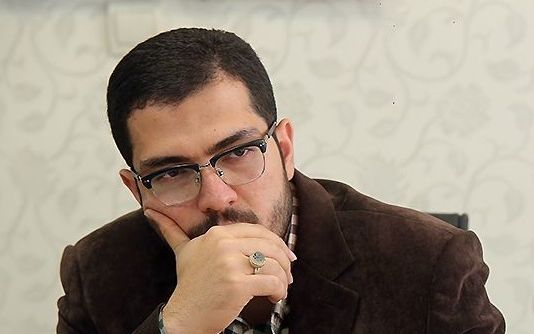
Iran's Revolutionary Guard has arrested admins of social media news chasnnels considered regime insiders for spreading fake news and “agitating public opinion.”
At least three admins of separate channels on the social media app Telegram have been arrested by the IRGC’s internal security service, the Guard’s official Telegram channel said on Thursday.
The announcement said that these Telegram channels, which were reporting on internal Iranian politics and rumors, “published classified information and documents,” and spread “fake and selective news to sow discord among high-level officials.”
In recent years the Revolutionary Guard has set up multiple social media accounts, including on Telegram, to spread its version of events. This extensive network is part of what has come to be known as IRGC’s “cyber army”.
The announcement made by the IRGC Intelligence Organization did not reveal the names of those detained, but reports circulating on social media in Iran say one person is Ali Gholhaki, a journalist who supports hardliners in the political establishment and often publishes first-hand news about impending decisions or developments.
One expert Iran International spoke with was surprised if Gholhaki would have been involved in disclosing classified information. His track record shows he is a well-informed insider whose political revelations often prove to be correct after a few days.
One example was during the presidential election in June 2021, when he was the first to report that the constitutional watchdog, the Guardian Council, was set to disqualify a few key candidates.
Gholhaki and the three Telegram channels mentioned are all close to the Revolutionary Guard and it is not clear why they were arrested and what else might be behind the move.
The IRGC announcement mentions no examples of what information the three channels disclosed.
At this stage, speculations among observers generally relate to possible factional infighting.
One theory involves parliament speaker Mohammad Bagher Ghalibaf who was discredit when similar Telegram channels were involved in disclosing that his family took a luxury shopping trip to Turkey in April amid an economic crisis and rising poverty.
Ghalibaf at the time threatened legal action against those who “defamed” him, but later other events pushed the scandal into relative obscurity.
Another theory relates to a reported clash at a recent meeting of the Expediency Council, another constitutional body, where supposedly hardliner politician Saeed Jalili and former parliament speaker, moderate-conservative Ali Larijani argued about Iran’s nuclear policies. These same type of Telegram channels leaked that the two had a fierce argument when Jalili proposed pulling out of the Nuclear Non-Proliferation treaty (NPT).
Yet another theory is that the IRGC intelligence wants to show it is in charge and omnipotent after repeated deadly incidents among it personnel in recent weaks.
Two commanders of the Guard’s extraterritorial Quds (Qods) Force died in May, one shot multiple times in broad daylight outside his home in Tehran and another fell form the rooftop or balcony of his house. Immediately suspicions fell on Israel that has apparently been behind a series of spectacular attacks on Iran’s nuclear and military sites, as well as key individuals.
Following the deaths of the Quds officers, at least two weapons experts working for the IRGC also died mysteriously.
These sort of evets since July 2020 have dealt a serious blow to the image of IRGC Intelligence, as Iranians on social media make fun of its inability to protect its own, while it claims to intimidate enemies.
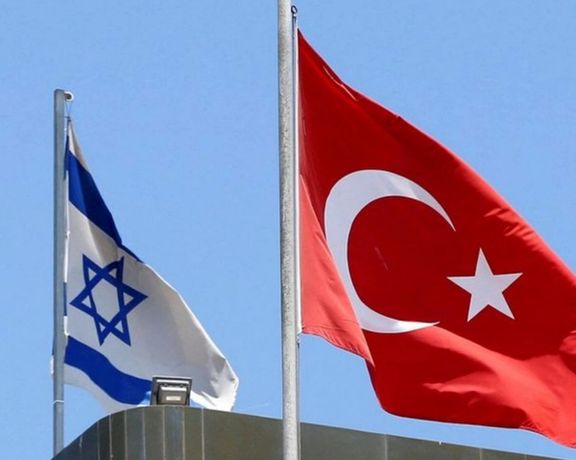
Turkey has reportedly warned the Islamic Republic against attacking Israelis in Turkey, saying it is not prepared to allow Iran to use its territory to carry out acts of terrorism against other nations.
According to an unsourced report on Israel’s Channel 12 news on Wednesday, Ankara has conveyed “blunt and forceful messages” to Tehran regarding the issue amid an urgent Israeli warning to its citizens not to travel to Turkey.
Israeli Foreign Minister Yair Lapid called on Israelis in Turkey on Monday to leave immediately and for citizens to cancel travel plans to the country following reports that an Iranian plot to assassinate Israelis in Istanbul was foiled at the last moment, and that Turkish authorities had uncovered a network of Iranian agents aiming to target Israelis.
Despite the threat posed by the Iranian agents in Turkey and the stern travel advisory, some Israelis are reportedly ignoring the warnings while Turkey has expressed its unhappiness with the expected blow to its tourism.
Turkey’s chief rabbi told The Jerusalem Post, “I think that Israelis should continue to come and visit... They can come and enjoy it without making a fuss about it.”
“There was an issue that occurred, [and] the State of Israel rose to its feet – and rightly so... We have police officers guarding our synagogues on behalf of the government,” he said.
The members of the community have remained careful ever since “twice we had a disaster” – namely, the terrorist attacks that occurred at the Neve Shalom synagogue in 1992 and 2003, he noted.